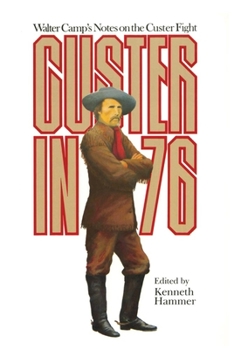Custer in '76: Walter Camps Notes on the Custer Fight
Select Format
Select Condition 
Book Overview
"Solid, firsthand material bearing on the Custer fight, invaluable to anyone studying the Little Bighorn."-Robert Utley, author of Cavalier in Buckskin: George Armstrong Custer and the Western Military Frontier "Custer in '76 is a treasure trove of information, and stands as one of the few essential books in the vast Custer bibliography."-Paul A. Hutton, editor of The Custer Reader This collection of exciting, absorbing personal accounts from survivors...
Format:Paperback
Language:English
ISBN:080612279X
ISBN13:9780806122793
Release Date:July 2014
Publisher:University of Oklahoma Press
Length:320 Pages
Weight:1.11 lbs.
Dimensions:0.9" x 6.0" x 9.0"
Related Subjects
19th Century History Leaders & Notable People Military Modern (16th-21st Centuries)Customer Reviews
5 ratings
CUSTER IN '76
Published by Thriftbooks.com User , 14 years ago
CONDITION OF BOOK ORDERED: NEW AND PERFECT I HAVE YEARS OF EXPERIENCE WITH THIS BOOK...IT BEING BEST ACCOUNT OF BATTLE.
Important sourcebook of the Custer fight
Published by Thriftbooks.com User , 17 years ago
Walter Camp was a railroad engineer most of his life, but as a hobby he enjoyed studying the various Indian fights that had occurred in the West, especially the Custer battle at the Little Big Horn. He visited the site numerous times and, more importantly, conducted scores of interviews with eyewitness participants, Indian and white. He kept files of his findings and after his death these files found their way into various libraries around the country. Kenneth Hammer here compiles the "notes" Camp left regarding the Custer fight. They represent, along with W.A. Graham's documented source book of letters, newspaper clippings, legal documents, and numerous other Little Big Horn memorabilia (THE CUSTER MYTH), the most important wellspring of information regarding the June 25, 1876, disaster. The information culled from the interviews with Curly, the Crow scout who was the last to see Custer alive and live to tell about it, are particularly informative in reconstructing what happened that day. He eventually interviewed over 60 survivors between 1908 and 1919. All serious books about the Little Big Horn fight will have to acknowledge the work done by Camp, and anyone with more than just a passing interest in the battle will want this book.
Hammer enhances Camp's wonderful interview Notes
Published by Thriftbooks.com User , 21 years ago
Walter Camp had the great fortune and drive to visit the critical sites of the old west and seek out and interview actual participants and witnesses. Unfortunately, Camp did not survive to put his great efforts into a book but Hammer does the next best thing possible by organizing Camp's would be book and providing editorial commentary to fill in the gaps. Hammer collects Camp's material on the Little Bighorn and every page is full of interesting information. My favorite parts of the book are references to participants other than the main characters such as Peter Thompson and other members of Custer's separate battalion that survived because their horses broke down prior to the descent into Medicine trail Coulee. Hammer does an excellent job of providing clarification of the participants or writings of Camp in the footnotes so that you almost have all your questions answered by Hammer. A delightful book without harsh judgment offered by Camp and a great collection of readable material. It must have been frustrating to have first person interviews with participants when their stories clashed, were foggy or perhaps grandiose such as Thompson's alleged view of the valley as Custer descended to the river. Camp not only interviewed troopers but also Custer's scouts and Sioux and Cheyenne participants. Camp did a lot not to just record history but to locate historical sites in the remote West like Slim Buttes that without his timely intervention may have otherwise been lost to history. The only unfortunate aspect of the book is that there isn't more material and that Camp's health failed before he could draw his own conclusions. He also had the greatest vacation hobby, exploring and researching the old west before it was very old.
All first hand accounts
Published by Thriftbooks.com User , 22 years ago
This book is used by most serious LBH writers and researchers as a very valuable reference. Just check the bibliographies of the most respected and thorough histories of the battle, and you will find Walter Camp's notes there. Reason enough that this book be on your shelf if you're a Custer/LBH buff. There is a wealth of information in these pages, especially the footnotes (which are often lengthy). Too bad Walter Camp died before he had a chance to put all his research together in his planned book. There are interviews with officers, enlisted men, white and Indian Army scouts and the Sioux/Cheyenne themselves. There are so many it becomes hard to keep them separate in one's mind, but that's a good thing.His summation at the end tends to place him in the "Custer crowd" in that he did not feel Custer disobeyed Terry's orders, and that Custer acted appropriately with the information available to him at the time, although he does feel Custer fragmented his forces too much before the battle. One has to give his opinion great weight because he talked firsthand to more of the survivors of the LBH than anyone else.
An excellent telling of the Custer fight
Published by Thriftbooks.com User , 24 years ago
I read Mr. Camp's classic account of the Little Big Horn several years ago. It remains on my shelf as one of the very best books on the battle. It was well written, detailed and colorful enough for any follower of the Custer's trail. I highly recommend this book, which I read just prior to visiting the Custer battlefield on the 106th anniversary. Not to be overlooked or missed.





